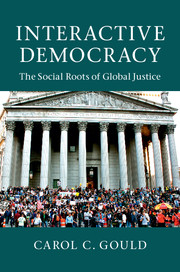Book contents
- Frontmatter
- Dedication
- Contents
- Acknowledgements
- Introduction
- Part I A theoretical framework
- Part II The social roots of global justice
- Part III Interactive democracy – transnational, regional, global
- 11 Diversity, democracy, and dialogue in a human rights framework
- 12 What is emancipatory networking?
- 13 Structuring transnational democracy: participation, self-determination, and new forms of representation
- 14 Democratic management and international labor rights
- 15 Regional vs. global democracy: possibilities and limitations
- Works cited
- Index
- References
15 - Regional vs. global democracy: possibilities and limitations
Published online by Cambridge University Press: 05 September 2014
- Frontmatter
- Dedication
- Contents
- Acknowledgements
- Introduction
- Part I A theoretical framework
- Part II The social roots of global justice
- Part III Interactive democracy – transnational, regional, global
- 11 Diversity, democracy, and dialogue in a human rights framework
- 12 What is emancipatory networking?
- 13 Structuring transnational democracy: participation, self-determination, and new forms of representation
- 14 Democratic management and international labor rights
- 15 Regional vs. global democracy: possibilities and limitations
- Works cited
- Index
- References
Summary
Introduction
Regionalism has come to the fore in recent economic and political developments and has been an important subject of attention in contemporary political science. Especially with the EU’s rise to prominence over the last decades (despite the various setbacks), theorists have taken notice of the new forms of regional coordination not only there but in other parts of the world (e.g., Latin America, Southeast Asia), where these have largly centered on economic cooperation, though in some cases have involved political organization as well. Considerably less attention has been paid to the normative implications of these developments, though some theorists – especially of international law – have pointed to the regional human rights agreements that are beginning to be taken seriously, while others (especially of international relations) have commented on the democratic deficit in the EU.
Although theorists of democracy and human rights have analyzed the justifications and roles that these norms play in national contexts and increasingly even in global contexts, scant attention has been given to their potential for guiding and constraining regional political and economic development. Instead, cosmopolitan theorists of democracy and of justice often want to move the discussion directly from the level of the nation-state to that of the world as a whole, with little analysis of the emerging regionalism, increasingly recognized as important in practical affairs and public policy.
- Type
- Chapter
- Information
- Interactive DemocracyThe Social Roots of Global Justice, pp. 256 - 269Publisher: Cambridge University PressPrint publication year: 2014



